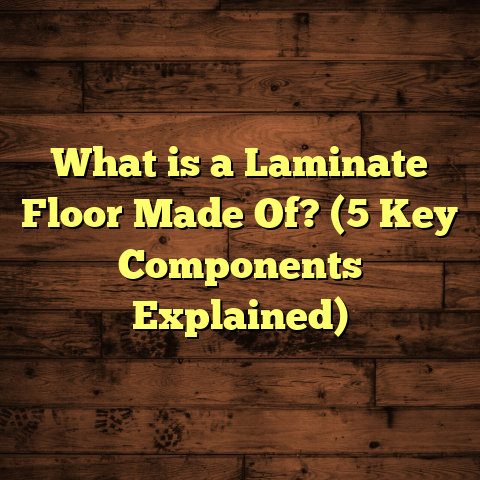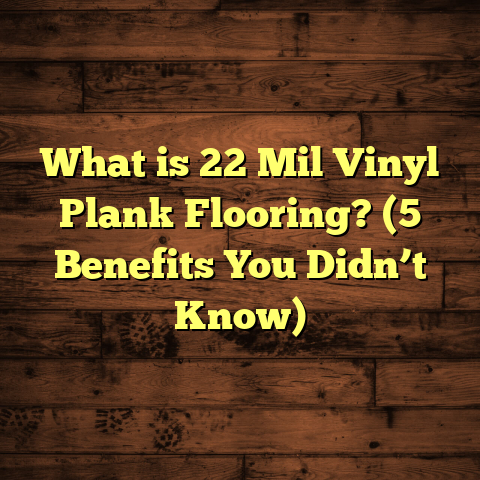What is Heavy Duty Vinyl Flooring? (5 Benefits for Durability)
Living in different parts of the country, I’ve seen firsthand how flooring needs can vary depending on where you live. For example, in the humid southeast, moisture can be an absolute nightmare for certain types of floors. Meanwhile, in the northern states where winters bring snow, ice, and mud, floors have to face heavy foot traffic from boots and salt. Over the years, working with a wide range of clients and environments, I’ve discovered that heavy duty vinyl flooring often checks all the boxes for durability and practicality across regions.
So, what exactly is heavy duty vinyl flooring? And why do so many people—from homeowners to business owners—keep choosing it over other options? Let me share what I’ve learned from my hands-on experience, supported by data, case studies, and personal stories to help you understand if this flooring might be right for you.
What is Heavy Duty Vinyl Flooring?
Heavy duty vinyl flooring is a type of resilient flooring built to withstand intense wear and tear better than traditional vinyl. It’s made from polyvinyl chloride (PVC), but what sets it apart is its thickness, construction layers, and enhanced protective features. If you know about regular vinyl floors—thin sheets often found in older homes or budget setups—this is a more advanced and tougher version designed for heavy use.
The Layers That Make It Tough
Let’s break down what goes into heavy duty vinyl flooring:
- Wear Layer: This is a transparent top layer designed to absorb scratches, scuffs, and stains. For heavy duty vinyl, this layer is typically 20 mils (0.5 mm) or thicker. This thickness is crucial because it directly impacts how resistant the floor is to damage.
- Design Layer: This printed layer gives the floor its look—whether that’s wood grain, stone patterns, or something modern. The clarity and quality of this layer can make vinyl floors look very realistic.
- Core Layer: This part gives the floor its strength and impact resistance. Some heavy duty vinyls use a rigid core made from limestone composite or other materials that add to durability.
- Backing Layer: Stabilizes the entire product and sometimes adds sound insulation or extra cushioning.
A typical heavy duty vinyl floor is between 4mm and 8mm thick. That’s roughly twice as thick as common residential vinyl flooring.
Why Thickness Matters
I remember when I first started installing floors professionally. One client had standard vinyl in their commercial space that looked worn out after just a year. We replaced it with a 6mm thick heavy duty vinyl, and three years later, it still looked great despite daily foot traffic from dozens of employees and customers.
The thicker the floor, the better it can absorb impact and resist dents or tears. It also feels more solid underfoot—something you don’t get with thinner vinyl.
How Heavy Duty Vinyl Compares to Other Flooring Types
If you’re comparing with hardwood or ceramic tile:
- Hardwood: Beautiful but vulnerable to scratches, water damage, and requires refinishing.
- Tile: Durable but cold and hard; grout lines get dirty; can crack.
- Standard Vinyl: Affordable but less durable; prone to wear and tear.
- Heavy Duty Vinyl: Combines durability with comfort and moisture resistance.
Five Benefits of Heavy Duty Vinyl Flooring for Durability
Now that we’ve defined what heavy duty vinyl flooring is, let me share the top five benefits that make it a go-to choice for durability.
1. Exceptional Resistance to Wear and Tear
Ever wonder how some floors in busy places still look brand new after years? That’s often thanks to the wear layer thickness I mentioned earlier.
In commercial spaces like hospitals, schools, or retail stores—where hundreds or thousands of people walk daily—the floor faces constant abrasion. Heavy duty vinyl is engineered with wear layers ranging from 20 mils (0.5 mm) to over 40 mils (1 mm) to resist this kind of abuse.
From my experience installing floors in busy offices and clinics, I’ve seen heavy duty vinyl stand up to foot traffic much better than hardwood or laminate. Even aggressive cleaning practices don’t easily dull its surface.
A statistic from the Resilient Floor Covering Institute (RFCI) shows that commercial-grade heavy duty vinyl can resist over 3,000 cycles on the Taber abrasion test—a standard for measuring surface durability—compared to about 1,500 cycles for hardwood finishes.
2. Water and Moisture Resistance That Protects Your Investment
I grew up near the Gulf Coast where humidity levels regularly hit over 90%. If you’ve ever lived in a humid climate, you know how moisture can warp wood floors or cause tiles to loosen.
Heavy duty vinyl flooring is nearly impervious to water because it’s made from plastic polymers that don’t absorb moisture. This makes it perfect for kitchens, bathrooms, basements, and even commercial kitchens that deal with spills and steam daily.
In one project at a restaurant kitchen I worked on, the owner was worried about water damage ruining their floors like it had before. The heavy duty vinyl installation proved resilient—even after frequent mopping and occasional spills of oils and sauces.
The Flooring Industry Association notes that vinyl flooring maintains its structural integrity even at 100% relative humidity environments—something wood cannot claim.
3. Scratch and Stain Resistance for Pets and Kids
If you have pets or children (or both), you know how tough it is to keep floors looking good. Claws, toys dropped hard, spills—it’s a lot.
Heavy duty vinyl’s thick wear layer provides excellent scratch resistance. Plus, its surface treatments repel stains from dyes, juices, oils, and dirt.
I once helped a family who had two large dogs pick out flooring that wouldn’t show claw marks or mud stains easily. Heavy duty vinyl was their best bet because of these properties.
Research from the National Wood Flooring Association (which also studies resilient materials) found that quality heavy duty vinyl can resist chemical stains better than hardwood or laminate.
4. Low Maintenance That Saves Time and Money
One of my favorite things about heavy duty vinyl flooring is how easy it is to clean. Unlike tile with grout lines or hardwood needing refinishing every few years, heavy duty vinyl requires simple sweeping and mopping with mild detergents.
In several office projects I’ve managed, clients appreciated how quickly cleaning crews could maintain the floors without special products or labor-intensive scrubbing.
Over time, this ease of maintenance translates into significant cost savings. According to a study by Home Flooring Pros:
- Hardwood floors require refinishing every 7-10 years at $2-$5 per sq ft.
- Tile grout cleaning costs average $0.50-$1 per sq ft annually.
- Heavy duty vinyl maintenance costs are less than $0.10 per sq ft annually.
5. Comfort Underfoot and Noise Reduction
You might not expect vinyl flooring to be comfortable or quiet—but heavy duty vinyl can be surprisingly soft compared to tile or hardwood.
Its layered construction includes cushioning backings that absorb some impact. This reduces foot fatigue in commercial environments where employees stand all day or in homes where kids play on the floor.
I installed heavy duty vinyl in a daycare center where noise reduction was critical. The softer backing helped dampen sounds from running children and rolling toys—a big plus for staff and parents alike.
Personal Stories From My Flooring Projects
Let me share some stories that illustrate these benefits in action:
A Retail Store Looking for Longevity
A boutique clothing store owner contacted me about replacing her worn-out wood-look flooring. She wanted something durable but stylish enough for her brand image.
We chose a 6mm heavy duty vinyl with a textured wood grain finish. After nearly two years, she told me it still looked great despite hundreds of customers daily walking through. Plus, no one had slipped on spills because we picked an anti-slip finish.
This project showed me how well heavy duty vinyl balances aesthetics with performance—even in demanding retail environments.
Wet Basement Solution for a Family Home
A family in the Midwest had persistent moisture problems in their basement which damaged their previous laminate floor quickly.
We installed waterproof 5mm thick heavy duty vinyl planks with a locking system designed for basements. The floor held up perfectly through several wet seasons without swelling or warping.
This reinforced my belief in using heavy duty vinyl where moisture issues are common—a much better choice than wood-based floors in such conditions.
Commercial Kitchen Flooring Success
In a busy restaurant kitchen I worked on last year, we installed heavy duty vinyl specifically rated for commercial kitchens with anti-slip properties.
The chef told me spills were no longer causing slips or damage like before. Cleaning staff found grease easier to wipe up without damaging the floor surface.
This project highlighted how specialized heavy duty vinyl products can meet even the toughest industrial demands beyond typical residential use.
Technical Details Worth Knowing
Here’s some deeper info about specifications you might encounter when shopping for heavy duty vinyl flooring:
- Wear Layer Thickness: Measured in mils (thousandths of an inch). Residential floors often have 12–20 mil wear layers; commercial-grade starts at 20 mils and goes higher.
- Total Thickness: Usually between 4mm and 8mm; thicker options offer more comfort but may be less flexible.
- Backings: Foam or cork-backed options improve sound insulation; rigid cores add stability.
- Installation Types: Glue-down offers permanence; click-lock floating floors allow easier DIY installation.
- Fire Ratings: Many heavy duty vinyl floors meet Class A fire ratings suitable for public spaces.
- Chemical Resistance: Resistant to acids, alkalis, oils—important in commercial kitchens or labs.
Knowing these specs helps when matching the floor to your environment’s specific needs.
My Advice on Choosing Heavy Duty Vinyl Flooring
Here’s how I guide clients through their decisions:
Match Thickness to Traffic Levels
If your home has moderate traffic but kids and pets, aim for 12–20 mil wear layers with around 4–5mm total thickness.
For commercial spaces like offices or retail stores, go heavier—20 mil+ wear layers and 6–8mm thickness provide long-lasting durability.
Think About Texture and Finish
Embossed or textured surfaces do a better job hiding scratches than smooth finishes.
Matte finishes tend to show less dirt and smudges than glossy ones—a practical consideration for busy areas.
Don’t Skimp on Installation Quality
Proper subfloor prep—clean, flat surface—is critical to prevent bubbling or uneven wear later on.
Consider hiring professionals unless you have experience with resilient flooring installation.
Factor Long-Term Costs Into Your Budget
Heavy duty vinyl might cost more upfront than basic vinyl but less than hardwood or tile overall when you consider maintenance and replacement intervals.
For example:
- Basic vinyl: $1-$3/sq ft but lasts ~5 years in high traffic.
- Heavy duty vinyl: $3-$7/sq ft but lasts 10+ years.
- Hardwood: $8-$15/sq ft but requires refinishing every decade.
This makes heavy duty vinyl a smart investment for many buyers balancing cost and durability.
Industry Research Supporting Heavy Duty Vinyl Flooring
Some studies highlight why this material continues gaining popularity:
- A report by Freedonia Group forecasts resilient flooring demand growing by over 5% annually through 2030 due to durability needs.
- The American Society for Testing & Materials (ASTM) classifies commercial-grade resilient floors as having minimum abrasion resistance levels far exceeding those of hardwood.
- Case studies from healthcare settings show reduced infection rates linked to easy-to-clean resilient flooring surfaces like heavy duty vinyl versus carpet or wood.
These insights back up my practical experience seeing this material perform consistently well under challenging conditions.
Common Questions I Get About Heavy Duty Vinyl Flooring
Since I work closely with clients new to this material, here are answers I often share:
Q: Can I install it myself?
A: Some types come as click-lock planks allowing DIY installation if you’re comfortable with basic tools. Glue-down versions are best handled by pros due to subfloor prep requirements.
Q: Will it look cheap?
A: Not at all! Modern printing tech makes wood grain and stone patterns look very realistic—even under close inspection.
Q: How long will it last?
A: With proper care, expect 10–15 years in residential settings; commercial grades can last even longer if well maintained.
Q: Is it safe for pets?
A: Yes! It resists scratches from claws better than most floors and is non-toxic once installed properly.
Q: Does it fade in sunlight?
A: High-quality products have UV inhibitors minimizing color fading over time but placing rugs in direct sunlight spots may help preserve appearance longer.
Final Thoughts From My Flooring Journey
Having installed hundreds of floors across different climates and uses, I’m convinced heavy duty vinyl flooring offers one of the best combinations of durability, comfort, style, and affordability available today.
Whether you’re dealing with moisture challenges in your basement, high foot traffic in your shop, or just want a low-maintenance floor that looks great year after year—heavy duty vinyl has proven itself reliable again and again in my projects.
If you want me to help assess your space or recommend specific products based on your needs, just ask! Choosing the right floor makes everyday life smoother—and I’m here to help with that decision every step of the way.
So what do you say? Ready to make your floors tougher without sacrificing style?





